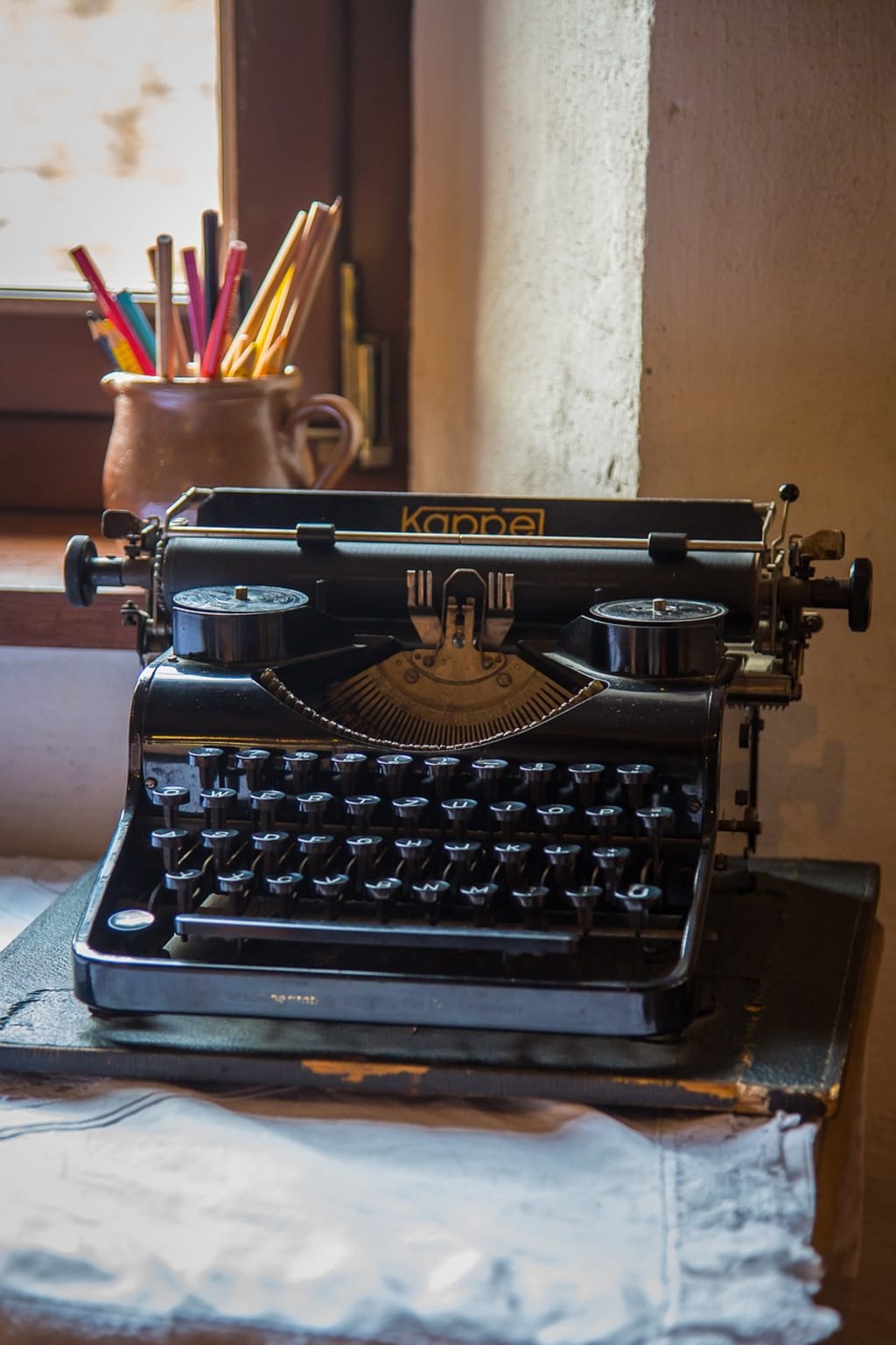
NaNoWriMo is something I’ve tried to participate in every year. Every year, I fail pretty hard at even approaching that 50,000 word count we all aspire to. I pick at bits and pieces of short stories and novels, never quite hitting the mark on any of them. Now, at the halfway mark of this year, I find myself ahead of schedule in the mid to high 20k range for my word count on a novel I literally conceived on November 1st.
This is a little wild for me. I’ve never been writing at the rate I have been now, and I feel super passionate about this story. I’m still not 100% sure what’s happening with me that’s propelled me into this writing power-mode I find myself in, but I can say one thing: I really want to keep it up past November. Unsurprisingly, it’s a great feeling to be writing a lot when you call yourself a writer. Yes, there are times when it feels like every word is wrong, or there are no words and writing seems like trying to dead lift two tons. Whatever your situation, I’ve found a few pointers and tips that have worked for me this NaNoWriMo season that may be helpful to writers young and old with your own stories.
1) Writing is a Team Sport (in a way)
I think the best thing that’s truly motivated me this time around has been the fact that my two friends are doing it with me. We all have different word counts, but it’s nice that we all have a common goal for the month. It also helps that they’re my roommates, so I’m always held accountable for my words. This one relies mostly on me feeling like I’ve set a goal and now I have to stick with it. It’s like having people cheering you on while also cracking the whip.
If you don’t have roommates, then get some writing buddies. I find that writers tend to stick together in a way, so you may have friends who are into writing already. Have meetups with these friends to write together, discuss your projects, etc. Whatever your process is, try to share what your goal is to them, and it will make you feel like it’s a goal you need to stick to.
2) If You Plan, Just Write. If You Just Write, Plan
This one involves a one-two-switcheroo, as I call it. At its core, this is another way for me to say shake it up and experiment a little bit. I’ve always tried planning my writing, especially when working on longer novels like the one I’ve started this month. That tends to fall apart, and I tend to poke holes in my plot before I’ve even gotten to the meat of the story.
This time, I’ve tried to not plan anything, and as result I found myself a decent way through this story before I knew what it was really about. All I knew was I wanted to write about vampires, and so that’s what I did. I didn’t know it would turn into some kind of story where vampirism is a stand-in for other issues faced by young women today, but that’s what happened naturally. I didn’t plan to have any deeper themes; they just appeared. I think this has made me trust my subconscious a little more in that regard. I like discovering the story now and writing it in separate scenes to be woven together at a later stage in my process. I’m finding this works for me. Last year, I would’ve cringed and said there was no way I could write anything without index cards detailing characters, descriptions, plot points, etc. At the five figure word count I’m at right now, I’d say this is a change for the better. On the flip side, trying to plan when you usually don’t might drum up some excitement for the plot and character arcs you’ll be writing, so that could be a fun, different way to write your story.
3) Shut off the Editor (Before you tell me you can’t…)
It’s the most cliché advice ever, but you know I have to say it. Letting yourself write without editing things out will work in your favor, I promise. I’ve found that my editor tends to make me write less because it doesn’t want me to have a superfluous word in there. It’s like I feel everything has to be perfect from the start and I can’t add unnecessary scenes or obvious expository information first time around.
However, this month I didn’t quite have a plan, so I decided, to just put everything out there. What I found is that having that information on the page is good. You can always cut the excess. I think of it as I can put things on the page maybe a little less elegantly than I would like, but I can instead go back to these scenes later. Once they’re on the page, they’re tangible, and I can write them nicely and see what I want to say, and more artsy ways I can say it. The point is, the more you have written, the more you have to work with when you start the editing process.
Another weird tidbit about this point: I shut my eyes or look away from my screen when I write. It’s like a way for me to simply listen to the keyboard and almost give me the illusion that I’m writing more than I actually am. Hearing the keys and then looking back to see a big block of text is comforting to me, and makes me feel like I wrote a lot. I just did it for this paragraph and it flowed out of me pretty quickly. This is a weird tip, I’ll say again, so it might not work for you. Try it and see what you come up with.
4) Skip Around the Story
I hit on this a little in point 2, but this can really save you. Sometimes writing those big important scenes you have stuck in your head first can be a good thing. When you have your favorite bits written, or the ones you think will be what you want to write most, you can worry about connecting them. This goes back to having more words on the page. You don’t have to write in order. Sometimes the story needs a little shaking up to get it to be what it wants to be. Don’t limit yourself.
5) Make a Routine of It
I recently got an awesome regular 9-5 job. It has benefits and everything, not like the full time retail or temp positions I’ve had in the past. The good thing about this is that I come home, I make dinner, I write. There’s routine to my life now, something that I never knew would be as beneficial to me as it is.
If you want to make a career out of writing, or dedicate at least a good portion of your life to writing, you have to carve out time for it every day. For example, as I’m writing this, I’m on my way to an anime convention in New York. I knew I’d get to New York late and wouldn’t want to write at one in the morning. So I compromised and now I’m writing on a super bumpy Greyhound. It’s not glamorous, and I have little to no space. I also totally sat away from my two friends so I wouldn’t get distracted, (so sorry to my antisocial writing behavior to them, as they’re most likely reading this now) and I broke the halfway point at 25,000 words a day early. I’m totally ahead by a day or two, according to the word count schedule I’ve written out.
The point is, it’s good to have a designated time to write during your day. It makes you look forward to it every day and plan for it.
6) Writing Music
Speaking of anime, I find anime original soundtracks to be incredible writing music. I’ve been jamming to the Violet Evergarden soundtrack when I write my soft scenes, and the Jojo’s Bizarre Adventure: Stardust Crusaders soundtrack for more intense scenes. Having good writing music can really put you in the mood and help you get motivated and in the mood to write.
It’s different for everyone. Some people can listen to lyrics while they write, and I simply can’t do that. Experiment with different genres and sounds, and try to fit the mood and tone with what you’re writing. Another fun thing to try are Youtube videos with nature sounds, like waterfalls or the forest. This kind of background noise can be just as helpful, and they can put you at peace so you can write without stress.
7) Keep a Word Count Calendar
This is a cute one my roommates and I do. We have a calendar with our word counts being written each day in color coordinated pens. It’s a visible way to track your progress, and it’s a nice thing to look forward to at the end of the night. It’s the last thing I fill out before I go to bed. Make your own calendar, like I did on a piece of printer paper, or just write it on an existing calendar. I like being able to see how far I am, and seeing how many words I write a day. It sets a daily goal for me too. I try to get to close to 2,000 words a day, and so far I’ve been doing pretty darn good, if I say so myself. I’m not perfect, but again, as long as you have some kind of goal, it’s easier to get yourself writing.
Why stop at NaNoWriMo? These tips are good to get you moving this month, however you can also use them for other months. Set your own monthly goals, or daily goals. Writing is hard, I know. No seriously, I know. My hands are cramping in this weird position on the bus. But, if it’s something you want to be serious about, it’s good to force yourself a little bit and have some neat little tips to keep your creativity operating. With that, I’ll let you enjoy the rest of NaNoWriMo. Happy writing!






Comments
Sam is not accepting comments at the moment
Want to show your support? Send them a one-off tip.